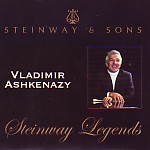It couldn’t have been easy for Steinway Legends’ A&R suits to program two discs that provide a judicious overview of Vladimir Ashkenazy’s wide-ranging and voluminous piano discography. Not surprisingly, Russian music dominates via commanding and idiomatic performances of Scriabin’s Fifth Sonata, three Rachmaninov Etudes-Tableaux Op. 39 (Nos. 1, 2, and 5), two pieces from Prokofiev’s Romeo and Juliet, Taneyev’s daunting G-sharp minor Prelude and Fugue, and Tchaikovsky’s Dumka.
Type Q1448 in Search Reviews for my comments on Ashkenazy’s 1967 Chopin E major Scherzo and C-sharp minor Prelude Op. 45–these works bracket an A-flat Op. 59 No. 2 Mazurka recorded live in 1972. New to CD, it stems from an all-Chopin “Ashkenazy in Concert” LP that Decca ought to reissue in full. Ashkenazy plays the Mazurka with earthier abandon and more spontaneous inflections than in his relatively straighter studio version. Beethoven’s Op. 109 appears in Ashkenazy’s readily available 1976 traversal, while his more rhythmically compact, sonically clearer 1990 remake remains in catalog limbo.
However, Steinway Legends releases Ashkenazy’s 1976 Schubert D major D. 850 sonata for the first time on CD. Its high points include a propulsive, intelligently shaped opening movement, and in the Scherzo a broadly paced trio that oozes harmonic tension. Certain telltale signs indicate that Ashkenazy sticks to the Finale’s Moderato marking more out of obligation than conviction. For instance, he often checks his impulse to accelerate while maintaining an ironclad grip on the main theme that undermines its lyrical simplicity.
Incidentally, the table of contents doesn’t mention that the opening selection, Mozart’s Sonata in D K. 448 is a composition for two pianos. Indeed, you only learn the second pianist’s identity when you squint through the booklet notes’ fine print. This isn’t just an oversight; it’s a slap in the face of the late Malcolm Frager. Both artists deserve equal billing for such virile, deftly synchronized music making.
































